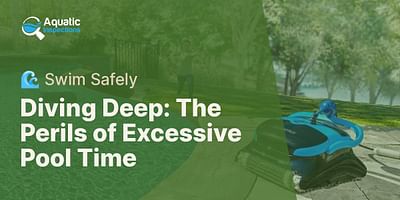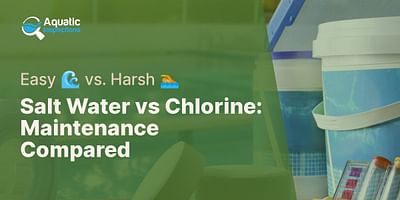Johnathan Waters is a certified pool inspector with over 15 years of experience in the field. He has a deep understanding of pool mechanics and is passionate about helping pool owners maintain their investments. Johnathan is known for his meticulous attention to detail and his ability to explain complex concepts in an easy-to-understand manner.
Saltwater pools have gained popularity in recent years as an alternative to traditional chlorine pools. While both types of pools have their own set of advantages and disadvantages, it's important to understand the pros and cons of having a saltwater pool before making a decision. In this guide, I'll walk you through the benefits and drawbacks of saltwater pools, so you can make an informed choice for your pool maintenance needs.
The Pros of Having a Saltwater Pool
1. Lower chlorine levels: One of the main advantages of a saltwater pool is that it requires lower levels of chlorine compared to traditional pools. Saltwater pools use a salt chlorinator system that converts salt into chlorine, resulting in a more gentle and consistent release of chlorine into the water. This can be beneficial for individuals with sensitive skin or allergies.
2. Reduced skin and eye irritation: Saltwater pools are known for their softer and more gentle water. The lower chlorine levels in saltwater pools can help reduce skin and eye irritation that is commonly associated with traditional chlorine pools. This makes saltwater pools a more comfortable swimming experience for many people.
3. Lower maintenance: Saltwater pools generally require less maintenance compared to traditional chlorine pools. The salt chlorinator system helps to automatically generate chlorine, reducing the need for manual dosing of chemicals. This can save you time and effort in maintaining your pool.
4. Longer-lasting chlorine: The chlorine generated in saltwater pools tends to have a longer lifespan compared to traditional chlorine. This means that you may not need to add chlorine to your pool as frequently, resulting in cost savings over time.
5. Softer water: Saltwater pools have a softer and silkier feel to the water, which many swimmers find more enjoyable. The water in a saltwater pool can leave your skin feeling smoother and less dry compared to traditional chlorine pools.
The Cons of Having a Saltwater Pool
1. Higher upfront cost: Saltwater pool systems can be more expensive to install compared to traditional chlorine systems. The initial investment for a salt chlorinator and the required equipment may be higher. However, it's important to consider the long-term savings in maintenance and chemical costs.
2. Equipment maintenance: Saltwater pools require regular maintenance of the salt chlorinator system. The salt cell, which converts salt into chlorine, needs to be cleaned periodically to ensure optimal performance. Additionally, the salt levels in the pool need to be monitored and adjusted as necessary.
3. Corrosion potential: Saltwater pools have a higher salt content, which can lead to corrosion of certain pool equipment and surfaces if not properly maintained. Regular inspections and maintenance are essential to prevent any potential damage caused by the saltwater.
4. Initial saltwater taste: When first transitioning to a saltwater pool, some swimmers may notice a slight salty taste in the water. However, the salt levels in a properly maintained saltwater pool are generally very low and should not be noticeable.
In conclusion, saltwater pools offer several benefits such as lower chlorine levels, reduced skin and eye irritation, and lower maintenance requirements. However, they also come with a higher upfront cost, require regular equipment maintenance, and have the potential for corrosion if not properly maintained. It's important to weigh these pros and cons and consider your specific needs and preferences before deciding whether a saltwater pool is the right choice for you.
For more information on saltwater pool maintenance, installation, and inspection, visit our website Aquatic Inspections. Our comprehensive guides and tips will help you keep your pool in top condition.












